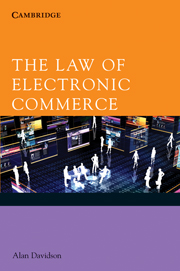Book contents
- Frontmatter
- Contents
- Acknowledgements
- Table of Cases
- Table of statutes
- 1 The law of electronic commerce
- 2 The rule of cyberspace
- 3 Electronic commerce and the law of contract
- 4 Shrinkwrap, clickwrap and browsewrap contracts
- 5 Electronic signatures
- 6 Copyright issues in electronic commerce
- 7 Electronic commerce – trade marks, patents and circuit layouts
- 8 Domain names
- 9 Domain name disputes
- 10 Uniform domain name dispute resolution policies
- 11 Jurisdiction in cyberspace
- 12 Defamation in cyberspace
- 13 Privacy and data protection in cyberspace
- 14 Electronic mail and online presence
- 15 National electronic surveillance
- 16 Cybercrime
- 17 Evidence of electronic records
- 18 Censorship – Broadcast and online content regulation
- 19 An international perspective
- Appendix A Electronic Transactions (Victoria) Act 2000
- Appendix B UNCITRAL Model Law on Electronic Commerce
- Appendix C Selected provisions Copyright Act 1968 (Cth)
- Appendix D ICANN Uniform Dispute Resolution Policy (UDRP)
- Appendix E .au Dispute Resolution Policy (auDRP)
- Appendix F National Privacy Principles
- Index
- References
1 - The law of electronic commerce
Published online by Cambridge University Press: 05 June 2012
- Frontmatter
- Contents
- Acknowledgements
- Table of Cases
- Table of statutes
- 1 The law of electronic commerce
- 2 The rule of cyberspace
- 3 Electronic commerce and the law of contract
- 4 Shrinkwrap, clickwrap and browsewrap contracts
- 5 Electronic signatures
- 6 Copyright issues in electronic commerce
- 7 Electronic commerce – trade marks, patents and circuit layouts
- 8 Domain names
- 9 Domain name disputes
- 10 Uniform domain name dispute resolution policies
- 11 Jurisdiction in cyberspace
- 12 Defamation in cyberspace
- 13 Privacy and data protection in cyberspace
- 14 Electronic mail and online presence
- 15 National electronic surveillance
- 16 Cybercrime
- 17 Evidence of electronic records
- 18 Censorship – Broadcast and online content regulation
- 19 An international perspective
- Appendix A Electronic Transactions (Victoria) Act 2000
- Appendix B UNCITRAL Model Law on Electronic Commerce
- Appendix C Selected provisions Copyright Act 1968 (Cth)
- Appendix D ICANN Uniform Dispute Resolution Policy (UDRP)
- Appendix E .au Dispute Resolution Policy (auDRP)
- Appendix F National Privacy Principles
- Index
- References
Summary
Electronic commerce refers to all commercial transactions based on the electronic processing and transmission of data, including text, sound and images. This involves transactions over the internet, plus electronic funds transfers and Electronic Data Interchange (EDI).
On one level, electronic commerce began in the mid-1800s, when the first contract was entered into using the telegraph or telephone. However, the expression ‘electronic commerce’ is typically used in connection with the expansion of commerce using computers and modern communications, most notably the internet and cyberspace. The development of security protocols has aided the rapid expansion of electronic commerce by substantially reducing commercial risk factors.
The advantages of electronic commerce to commercial parties include ease of access, anonymous browsing of products, larger choice, the convenience of shopping from the computer and enormous efficiencies. The disadvantages include the potential for invasion of privacy and security risks. There are also questions regarding jurisdiction, standards, protection of intellectual property, taxation, trade law and many other issues. Nevertheless, acceptance of electronic products and services has grown substantially.
Security is of paramount importance in electronic commerce. Public key cryptology was invented in response to security concerns and has revolutionised electronic commerce. Communications are now relatively secure: digital signatures or certificates permit the authentication of the sender of a message or of an electronic commerce product.
This book addresses legal issues relating to the introduction and adoption of various forms of electronic commerce.
- Type
- Chapter
- Information
- The Law of Electronic Commerce , pp. 1 - 10Publisher: Cambridge University PressPrint publication year: 2009
References
- 1
- Cited by



